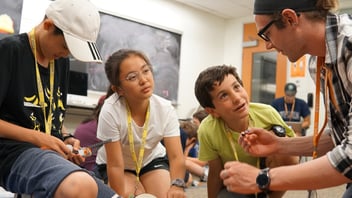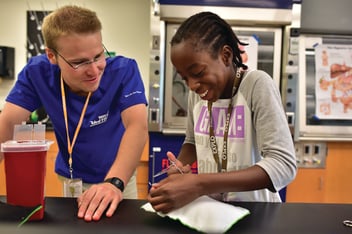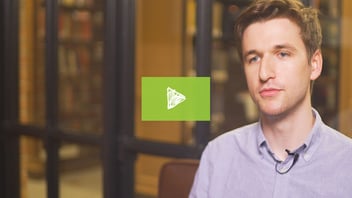5 Dangerous Things You Should Let Your Children Do

Children, as we know, can hurt themselves, especially when playing with pointy things like knives, arrows, scissors, or even fire. But there's a way around that — and it doesn't involve removing "every sharp object, every pokey bit" from their world. In fact, as Gever Tulley points out, it's really quite the opposite.
"We put warnings on coffee cups to tell us that the contents may be hot," Gever Tulley says during a TED Talk. "And we seem to think that any item sharper than a golf ball is too sharp for children under the age of 10. So where does this trend stop?"
Tulley, a former computer scientist, founded two schools centered on the principles of transformational, engagement-based learning. Throughout his work teaching and learning alongside children, he's developed one very strong theory, in two parts: First, when children are too coddled or protected from the things that could potentially harm them, they will get hurt when exposed to those things. And second, once children do get to work with dangerous materials (under adult guidance and supervision), they'll not only learn how to use them, but gain a healthy respect for them as well.
"And despite all of our best efforts and intentions," Tulley continues, "kids are always going to figure out how to do the most dangerous thing they can, in whatever environment they can."
So how can we give our children exposure to dangerous things, while keeping them safe at the same time? Tulley proposes a few "simple things that we can do to raise our kids to be creative, confident and in control of the environment around them:"
1) Play with Fire
"Learning to control one of the most elemental forces in nature is a pivotal moment in any child's personal history," Tulley says. Just imagining a child with a box of matches would cause any parent to rush to the rescue. But in a controlled environment, such as an open-air fire pit (and with safety equipment always at the ready) children can begin to understand how fire works, from combustion and oxygenation to exhaust and intake.
2) Own a Pocketknife
"Your first pocketknife is like the first universal tool that you're given. You know, it's a spatula, it's a pry bar, it's a screwdriver and it's a blade," Tulley says. With a pocketknife, as Tulley describes, a child can "develop an extended sense of self." By learning the basics of how to work it — "always cut away from your body, keep the blade sharp, never force it" — kids will become adept at using it, removing that potential danger.
3) Throw a Spear
"Practicing throwing things has been shown to stimulate the frontal and parietal lobes," Tulley says, "which have to do with visual acuity, 3D understanding, and structural problem solving, so it helps develop their visualization skills and their predictive ability." Throwing a spear involves the whole body — the brain to visualize and analyze things such as distance, perceived trajectory, speed, and force of impact, and the body to coordinate movement and launch the spear to where the mind wants it to go.
4) Deconstruct Appliances
"There is a world of interesting things inside your dishwasher," Tulley says. "Next time you're about to throw out an appliance, don't throw it out. Take it apart with your kid..." Figuring out how things work — what each piece actually does, and how they fit together once you've taken the whole thing apart — is fascinating. And more than anything, it's an exercise in breaking down complex mechanisms and problems down to their more manageable parts and working it until you puzzle out the solution. It's a way of understanding how something works — whether it's a camera or a dishwasher — from the inside out.
5) Break the Digital Millennium Copyright Act + Drive a Car with Your Child
"It's a very simple exercise — buy a song on iTunes, write it to a CD, then rip the CD to an MP3 and play it on your very same computer. You've just broken a law," Tulley says. By understanding more about how digital copyright works, children can have a better understanding of where to (and where not to) toe the line. And as for letting children drive cars, this just might be the most fun lesson there is.
Teaching teens to be courageous, curious, and creative, while understanding the boundaries that surround them, is a critical developmental skill. Many of the best summer camps focus on building this skill, among others.
To find out more about Gever Tulley's vision for children and education, check out the full TED Talk below:



